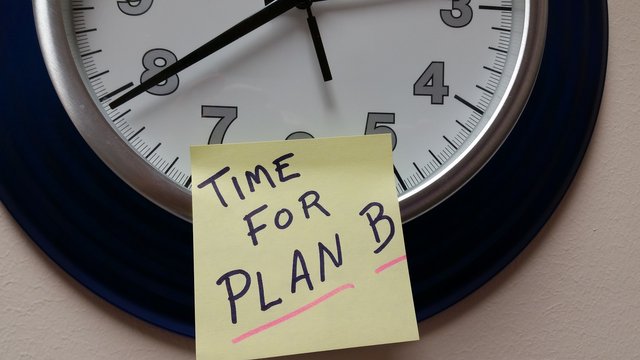Is Our Economy Sleepwalking With No Plan “B”?

Sleepwalking usually involves more than just walking while asleep. It’s much more complicated than that because there’s a series of complex behaviors that are carried out while sleeping. The most obvious of which is walking. However, there’s a whole host of things that can happen when you are sleepwalking such as:
· Sleep talking, when you don’t know what you are saying
· You have little or no memory of the sleepwalking event
· You can have inappropriate behavior such as urinating in a plant or close
· Screaming loudly without waking up
· Even violent attacks on the person trying to wake up the sleepwalker
Right now, our economy is sleepwalking on the razor’s edge with no plan “B” because most of us are sleepwalking and have little or no memory of what happened in 2008, we believe things are going well. Yet, here we are sleepwalking again. The very thin blurred line between an imaginary red-hot economy and complete collapse are merging and no one knows how it’ll play out because the Federal Reserve doesn’t really have a strategy. It’s wandering aimlessly in the desert wondering when it can raise interest rates without the inevitable market collapse.
At first glance it appears as though our financial world is okay. We saw increases in stock prices because of a great job market report. Last month’s job report was outstanding. What’s interesting about our current job report is that we are already beyond full employment.
They told us that this amazing job report was evidence of a robust economy, but is that true? In the 2008 crisis some 16 million workers fell off the books of unemployment because they just couldn’t find any work. Are they now being put back into this job’s market report? Is this why the expansion is happening? How many of these new jobs are being created for the human worker versus the robotic or AI worker? For some reason we have this belief that we are in a “Red-hot economy”. However, the worker isn’t feeling optimistic and with good reason.
Right now the stock market does not represent the real working economy in a holistic sense. If you remember we had huge amounts of quantitative easing in order to prop up the stock market. Right now it’s as though we’re walking in our sleep and don’t remember that we have trillions of dollars in toxic assets that need to be sold back into our red-hot economy. When the FED started selling these toxic debts back into the market, the market instantly became sick and crashed.
We don’t have a plan B and we simply have created new bubbles of toxic debt. I believe our stock market reflects the strength of a company’s future cash flow, but it doesn’t represent the health of our economy. This short-term view that our economy is strong, while we still have toxic debts that need to be cleared off the books for the Federal Reserve, means that we are still working in a rice paper thin economy that could collapse at any second.

You will benefit most by taking a step back from this daily uncertainty and volatility and think about the whole picture with discernment. Making critical decisions about long-term stability means that you must evaluate the long-term as well as the short-term gain.
Let me explain…
If we have $22 trillion dollars of governmental debt that needs to be paid back as well as:
· Student debt
· Personal debt
· Car loans
· Mortgages
· HELOC’S
While wages are rising in small amounts, do you think this creates a stable red-hot economy just because a job’s report is favorable?
Is it a red-hot economy when you are running $1 trillion dollar deficit or more per year?
Is it a red-hot economy if corporate debt is at a record $15 trillion dollars on the books as of this writing?
Is it a red-hot economy if consumers own $4 trillion dollars of personal debt not including mortgages?
We are walking a very thin line between economic collapse, extreme personal debt, toxic debt being held by the Federal Reserve, and no plan B. It may be time to take matters into your own hands. You will benefit most by creating your plan B now. Now is a good time to begin bootstrapping a business or a side hustle that provides you with another source of income. You can discover 6 lucrative ideas to make money on the side by clicking here.
Of course, it’s always wise to pay down your debt as much as you possibly can. However, learning how to live within your means needs to be practiced right now. Most people are addicted to debt because it is convenient. The pleasure of an instant gratification purchase leaves many people acquiring more personal debt. You will benefit most when you break this toxic habit now.
Have some hard assets like metals and cash. If you remember the 2008 crash, you will also remember that everything went on sale. Even vehicles! For the first time in history you could buy one and get one free. You want to have cash saved up for when things go on sale so that you can take advantage by making purchases that will benefit your asset base.
We also benefit by having discernment. Even though a good economic report always feels uplifting and positive we benefit when we ask ourselves, “Did the actual problem get solved?” We are a decade into this economic sleepwalking. Most people don’t have a memory of what happened. We have not solved our debt issues, and running a deficit is the issue. Until that is solved, you will benefit most by protecting your own financial well-being.
Vickie Helm is a bestselling author, business and asset strategist, and the CEO of Smart Group Firm. She has improved the success of more than a thousand companies and the lives of thousands of individuals throughout her career. You can learn more about Vickie at https://thesmartlifeclub.com or https://vickiehelm.com.